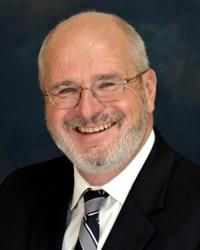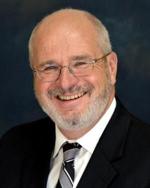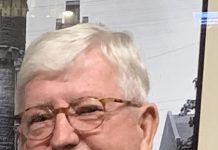In the garden of patriots
MARION, Indiana—The rows of white headstones stretch out in perfect alignment as far as my eyes can see.

John Krull, publisher, TheStatehouseFile.com
I’m here at Marion National Cemetery to pay my respects to my veteran, my father. Dad died earlier this year, almost 80 years after he wore his country’s uniform.
Dad enlisted in the waning days of World War II, as soon as he graduated from high school and well before he was even 18. After basic training, his orders took him to the Aleutian Islands off the coast of Alaska. He joked that the only thing he ever fought there were the mosquitoes, which he said came in swarms.
Dad didn’t find his military service to be painful. He’d been a poor boy, one who spent a fair slice of his childhood in an orphanage.
Those years were a time about which he never would talk. I knew that he’d known hunger when he was young. He always cleaned his plate, even when he didn’t care for the food on it, and he worried that his children didn’t have enough to eat.
Even when we had plenty.
When he got into the Army, he started receiving three solid meals a day. He grew three inches and packed on weight and muscle in a matter of months, emerging from his time in uniform physically transformed.
He also learned things. He’d never been taught to drive, but part of his duties in the service involved driving a truck.
Some sergeant handed Dad the keys and told him to teach himself.
Which he did.
“Only in the Army,†Dad would say, then shake his head.
But for all his wry bemusement, I knew Dad’s military service meant a great deal to him. He took one of the Honor Flights to Washington, D.C., late in his life. Afterward, he wore the ball cap from the flight that touted his Army years all the time.
As I stand now at his grave, I look at all the other headstones—thousands of them in this cemetery alone—reaching out into the distance.
Veterans, every one of them.
I decided to stroll about and see with whom my father is resting.
Just in the sections close to Dad, there are veterans from World War II, Korea, Vietnam, and the Gulf wars. Some are buried with their spouses. Some lie alone.
Many of the headstones—like Dad’s—refer to the people who loved them. Dad’s marker says he was a beloved father and grandfather. Other headstones describe a husband, a brother or a son who is dearly missed.
As I walk among these rows of uniform tombstones, I ponder at and think of all the stories—all the lives—that now rest here.
Dad’s life began in Minnesota and ended here in Indiana. His path through life carried him many places and brought him both joys and sorrows.
As I look at the headstones in their long lines, I wonder about the joys and sorrows experienced by those who lie here now. I hope it was more of the former and less of the latter, but I know that, for at least some of them, that couldn’t have been the case.
And I think about what ties all these honored dead together.
At one time in their lives, they all made a commitment to this country. They all said they were willing to die in its defense.
Most of them were young—very young—when they made that promise. That means they were willing to give up a great deal—willing perhaps to surrender the long years that stretched before them.
There have been times since Dad died a few months ago that I have awoken at night troubled by the thought that my father lies among strangers.
Now, though, I cannot think of a better place for his earthly remains to reside. Certainly he could not be in better company.
I walk back to Dad’s grave and stand for a moment, thinking of the boy he was and remembering the man he became.
I glance again at all the headstones stretching into the distance.
And I pray that my father and all who rest here know peace.
They earned it.
FOOTNOTE: John Krull is director of Franklin College’s Pulliam School of Journalism and publisher of TheStatehouseFile.com, a news website powered by Franklin College journalism students. The views expressed are those of the author only and should not be attributed to Franklin College
MARION, Indiana—The rows of white headstones stretch out in perfect alignment as far as my eyes can see.


I’m here at Marion National Cemetery to pay my respects to my veteran, my father. Dad died earlier this year, almost 80 years after he wore his country’s uniform.
Dad enlisted in the waning days of World War II, as soon as he graduated from high school and well before he was even 18. After basic training, his orders took him to the Aleutian Islands off the coast of Alaska. He joked that the only thing he ever fought there were the mosquitoes, which he said came in swarms.
Dad didn’t find his military service to be painful. He’d been a poor boy, one who spent a fair slice of his childhood in an orphanage.
Those years were a time about which he never would talk. I knew that he’d known hunger when he was young. He always cleaned his plate, even when he didn’t care for the food on it, and he worried that his children didn’t have enough to eat.
Even when we had plenty.
When he got into the Army, he started receiving three solid meals a day. He grew three inches and packed on weight and muscle in a matter of months, emerging from his time in uniform physically transformed.
He also learned things. He’d never been taught to drive, but part of his duties in the service involved driving a truck.
Some sergeant handed Dad the keys and told him to teach himself.
Which he did.
“Only in the Army,†Dad would say, then shake his head.
But for all his wry bemusement, I knew Dad’s military service meant a great deal to him. He took one of the Honor Flights to Washington, D.C., late in his life. Afterward, he wore the ball cap from the flight that touted his Army years all the time.
As I stand now at his grave, I look at all the other headstones—thousands of them in this cemetery alone—reaching out into the distance.
Veterans, every one of them.
I decide to stroll about and see with whom my father is resting.
Just in the sections close to Dad, there are veterans from World War II, from Korea, from Vietnam and from the Gulf wars. Some are buried with their spouses. Some lie alone.
Many of the headstones—like Dad’s—refer to the people who loved them. Dad’s marker says he was a beloved father and grandfather. Other headstones describe a husband, a brother or a son who is dearly missed.
As I walk among these rows of uniform tombstones, I ponder at and think of all the stories—all the lives—that now rest here.
Dad’s life began in Minnesota and ended here in Indiana. His path through life carried him many places and brought him both joys and sorrows.
As I look at the headstones in their long lines, I wonder about the joys and sorrows experienced by those who lie here now. I hope it was more of the former and less of the latter, but I know that, for at least some of them, that couldn’t have been the case.
And I think about what ties all these honored dead together.
At one time in their lives, they all made a commitment to this country. They all said they were willing to die in its defense.
Most of them were young—very young—when they made that promise. That means they were willing to give up a great deal—willing perhaps to surrender the long years that stretched before them.
There have been times since Dad died a few months ago that I have awoken at night troubled by the thought that my father lies among strangers.
Now, though, I cannot think of a better place for his earthly remains to reside. Certainly he could not be in better company.
I walk back to Dad’s grave and stand for a moment, thinking of the boy he was and remembering the man he became.
I glance again at all the headstones stretching into the distance.
And I pray that my father and all who rest here know peace.
They earned it.
John Krull is director of Franklin College’s Pulliam School of Journalism and publisher of TheStatehouseFile.com, a news website powered by Franklin College journalism students. The views expressed are those of the author only and should not be attributed to Franklin College






Good column, Krull.
Comments are closed.